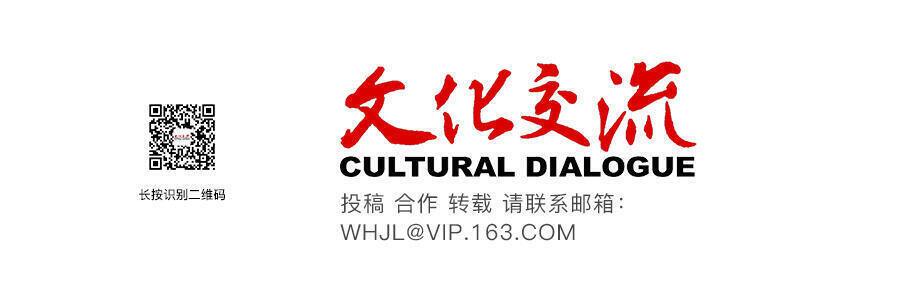每年11月,有个令中国人无比激动的“节日”——“双十一购物节”。而今年秋天,短短4天的“杭州国际工艺周”让杭州小伙伴们的消费欲更强了。
杭州创意设计中心3000平方米的场馆里,装下了来自中国、日本、法国、意大利、瑞士等多个国家的手作好物,大到家居用品,小到耳钉戒指……现场部分艺术品在展会头一天就被一抢而空。
在艺术品消费的背后是什么?
列夫·托尔斯泰说过:“艺术不是技艺,它是艺术家体验了的感情的传达。”一件好的工艺品不只是一个物件,而是艺术家的灵魂,是他生命的片刻驻留。艺术家的传奇之处在于可以通过自己的作品,带领我们走入一个又一个新世界。
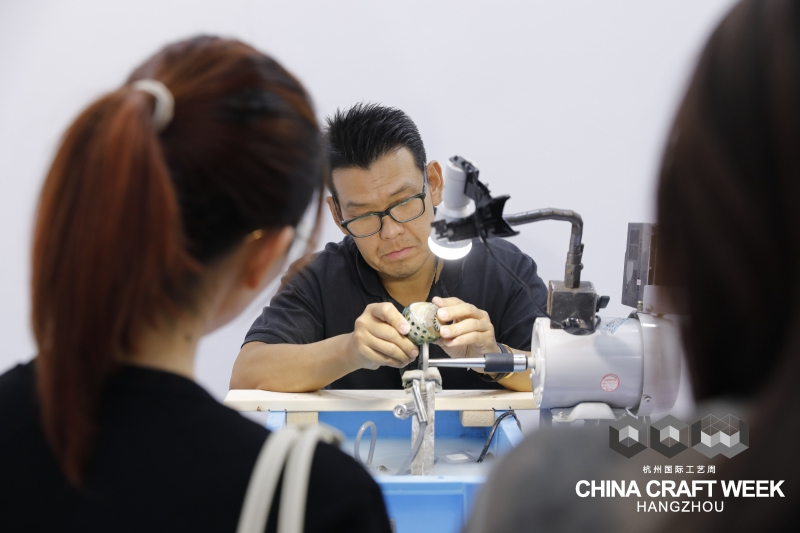
山田真照先生在现场制作
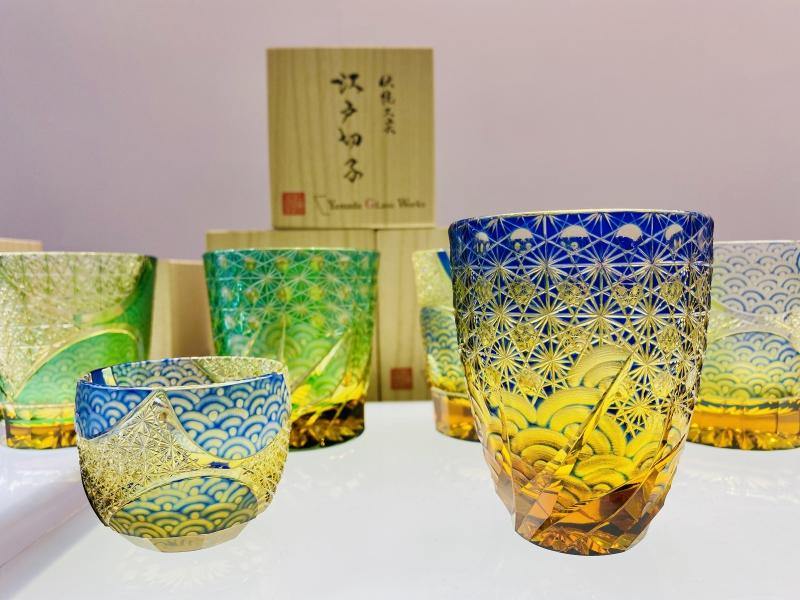
山田真照先生的作品
山田真照的手工水晶杯
走近日本展位,大家就会被清新又鲜明的和式风吸引。那些闪亮亮的水晶杯,散发着星星的光泽,令人不自觉地靠近。这是来自日本东京的山田真照先生带来的自有品牌“山田硝子”。
“硝子”是人造水晶的意思。我国明代的曹昭在《格古要论》里就曾说:“假水晶用药烧成者,色暗青,有气眼,或有黄青色者,亦有白者,洁白明莹,谓之硝子。”如今,硝子这个说法仍被日本保留,用来指称玻璃制品。
在日本的传统工艺中,“切子”的名气不小。这种传统的玻璃雕花工艺可以看作是日本的艺术瑰宝。“切子”的意思是指在玻璃器皿上进行加工打磨以形成漂亮的花纹。
江户切子手工玻璃杯,每只价格在2000~5000元人民币,尽管如此,30只杯子,4天时间全部售罄。
46岁的山田真照是山田硝子的第三代传承人,他的爷爷开启了山田硝子的品牌历史。回忆过往,他觉得走上手艺人这条路,既不可思议,又像命中注定。他的少年时期,也正是日本经济高速发展的时期,年轻的他同样喜欢当时年轻人喜欢的潮流事物,对未来充满各种想象。19岁时,他走进父亲的工坊,开始为父亲“打工”。这样一种200年历史的传统手艺,让他一干就是20多年。如今,他已经成为江户切子工会的活动部部长。20多年的制作经历,让硝子成为他生活中重要的一部分,也为他带来了更多的责任与荣誉。
传统切子工艺在日本的传承人越来越少,能做出精品的匠人更是凤毛麟角。山田介绍,完成一个完整的江户切子杯需要经过六个步骤——
第一步,图样设计,在玻璃上画出线条记号;第二步,用粗砂轮进行粗磨,切削出大致图案;第三步,用细砂轮切雕精细复杂花纹;第四步,用尖砂轮雕出花朵细纹;第五步,进行抛光打磨;第六步,粹磨,磨出明亮的光泽感。算下来,一天只能完成两只杯子。
此次来到中国,也是切子工艺的一次全方位亮相。一只玻璃杯价格在2000元以上,其实在开展前,山田可没有很高的预期,想象中应该是“看热闹”的人会更多,所以也没有带很多作品,只是精挑细选了图案经典、造型有代表性的样式来作为展示。“没想到全卖完了,中国的朋友们真的好热情,非常感谢啊!”山田有些不好意思地说,难掩心中的喜悦。
展览现场,陈先生提着打包好的江户切子水晶杯礼盒准备回家,木质的盒子沉甸甸,又很有古意。陈先生说他去日本旅行时就曾在高级的商场中看到过相似的水晶杯,当时没舍得买,回来后惦记了很久。这次在杭州能看到,他就赶紧下手买了,弥补了那时的小遗憾。他说,“这次在杭州买的与日本看到的价格竟然差不多,似乎还更便宜一些,至少省去了跨国携带回来的麻烦。”临走前,他还留下了山田的联系方式。
山田坦言,在中国受到这样的喜爱真是受宠若惊,他希望未来能够有更多的中日交流机会,带着更多的作品来展示,将日本这项传统的手工艺发扬光大,传承下去。同时,他也欢迎中国朋友去日本时可以更多关注日本的传统工艺制品,“那些美好的作品藏着日本的历史。”山田说。
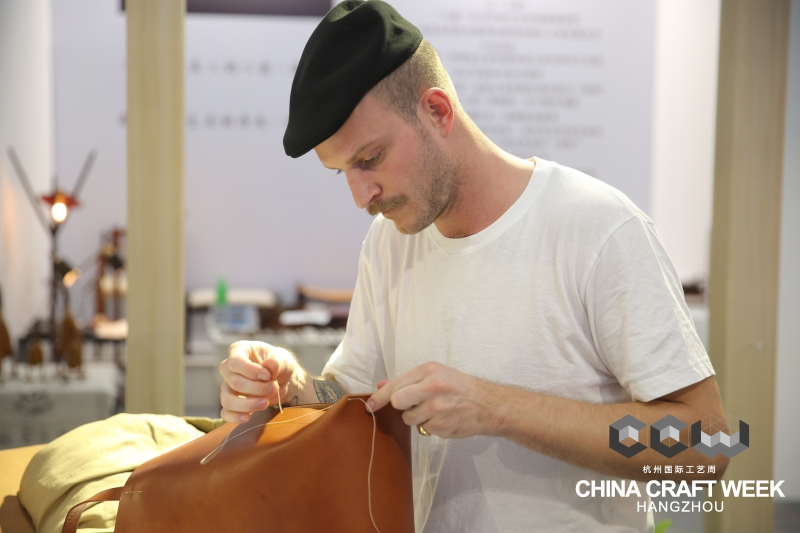
Marco Lazzaroni在现场制作皮具
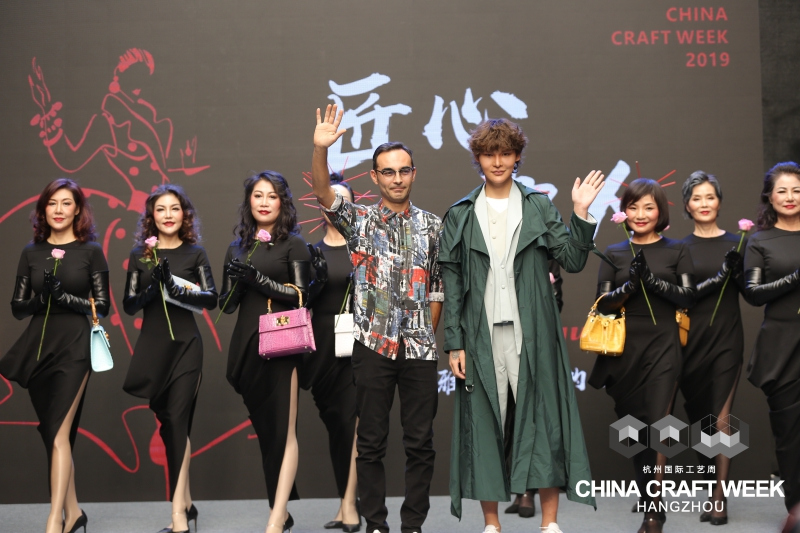
意大利皮具品牌Clamori设计师保罗·蓬佐(Paolo Ponzo)(前排左一)在国际工艺周走秀现场
瑞士小伙子的手工皮具
雪山、古堡、小镇、湖泊、葡萄酒庄园、巧克力……瑞士,是一个让人心醉的美丽童话国度。瑞士人热爱自然,善待自然。“杭州国际工艺周”瑞士馆的设计师们也将他们的生活理念带到了杭州。
皮具品牌VICUS由帅气的大男孩Marco Lazzaroni创立于2015年。虽然VICUS的皮具初看起来款式似乎不那么新潮,但是越看越有味道,它代表了瑞士传统的生产价值观,例如严谨、精确,以及对细节的关注和执着。每一只皮包都是用优质和传统的意大利托斯卡纳植鞣皮革制成的,边缘平滑,抛光润泽。Marco介绍说,所有皮具都是手工制作的,如果按照时间计算,一只完整的背包至少需要用上一整天的工作时间精心打磨。
一个20多岁的年轻小伙子怎么就爱上了制作皮具呢?Marco认为,现在的快速消费时尚实际上会给自然造成很大的负担,“我们应该用一些真正‘好’的物品,给地球减少一些负担。而且好的皮具是越用越美的,会留下时间的印记,那些是人生的痕迹。多少年过去,你会回想起与这个物件共同经历的岁月。”他递过来一只包,“你可以闻到皮革天然的气息,这样的皮革不含有对人体有害的物质,并且这样的物件未来是可降解的。”近距离看,你可以在每一个针脚间看到这个大男孩对自然的崇敬与珍爱。
VICUS的展位旁是设计师Zeno创立的服装品牌Zen O。这位瑞士设计师对大自然有着同样的观照。因为名字中的“zen”有“禅”的意思,他的设计也有着浓浓的佛系味道——他常在衣服上印上一个小和尚的小头像。而真正吸引人的,是这些衣服的来源——他回收一些品牌的过季库存服装,进行重新设计加工,印上时尚的图案,没想到受到年轻人欢迎。这些差点被丢弃的“垃圾”就这样被他“妙手回春”,找到新的价值。
瑞士馆的“潮”吸引了许多年轻人的光顾,而设计背后的理念更是得到杭州观众的认同。一位时尚的杭州姑娘挑选了一款产品,与Marco交流皮具的养护等问题。VICUS的包包在展会期间也被订购大半。
Marco非常喜欢杭州和杭州美食,他开心地分享道:“杭州真是一个快乐的地方,我们在这里认识了许多新朋友,他们会给我们讲述这里的生活,还会带吃的给我们分享。我也吃到了中国美食,我最喜欢‘外婆家’的味道。”
这么看来,一场展会,不止是物品的展示,也让不同国度的年轻人有了交流的平台。
The four-day event was held at the 3,000-square-meter exhibition space of Hangzhou Creative Design Center from October 24 to 27, 2019. Craft products on display were fashioned by designers and craftspeople in China, Japan, France, Italy, the United Kingdom, the United States, and Switzerland. These products caused a stir in Hangzhou. Most exhibits sold out on the first day.
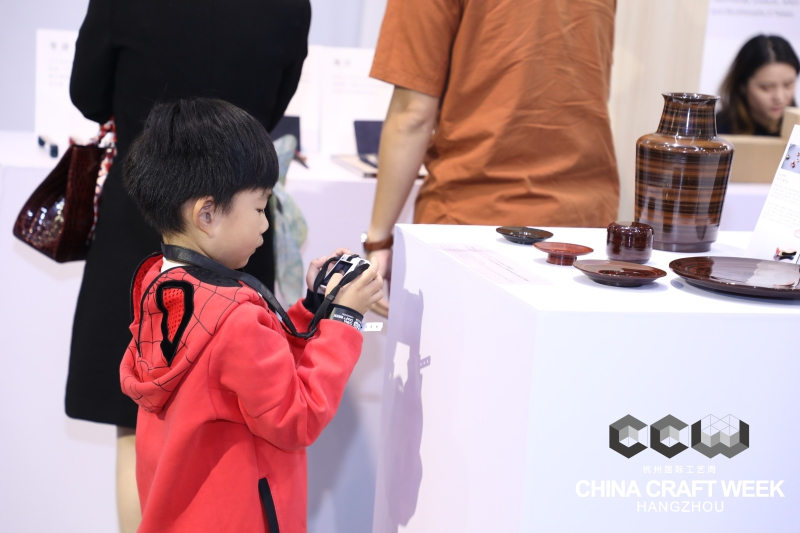
Yamada Glass
46-year-old Masaaki Yamada is a third-generation glass-making master of Yamada Glassworks located in Tokyo. He brought 40 glasses over to Hangzhou. These beautifully crafted glass products attracted the attention of visitors to the Japanese Pavilion at the exhibition. The prices of these fancy-looking glasses ranged from 2,000 to 5,000 yuan a piece. With no expectation that his products would sell out, he had just picked and packed 40 glasses with representative patterns and shapes to showcase tradition and imagination and craftsmanship for the event in Hangzhou. He was surprised to see the warmth Chinese friends showed toward his works. He smiled and said thank you again and again.
A Mr. Chen bought a Yamada glass, which he referred to as crystal glass, at the exhibition. Chen said that he had seen such luxury glass products at a top-class shopping place in Japan when he was on a sightseeing tour there. He thought them expensive and didn’t open his purse. But he regretted for a long while after he came back home. He was surprised to see Yamada glasses at the craft week. This time, he didn’t hesitate. “The price I paid for the glass is similar to that I saw in Japan. I don’t exactly remember the price in Japan, but I think the price is lower here and I don’t have the trouble of bringing it back all the way from Japan.” He went away happily, with the contact information on Masaaki Yamada.
Masaaki Yamada began to work at his father’s workshop at 19. He has worked in the traditional glassworks for more than 20 years. He says that he can only make two glasses a day, as a six-step procedure is time consuming.
Masaaki Yamada hopes to have more opportunities to present his craft in China. He also hopes that Chinese tourists can pay more attention to Yamada glass products while traveling in Japan.
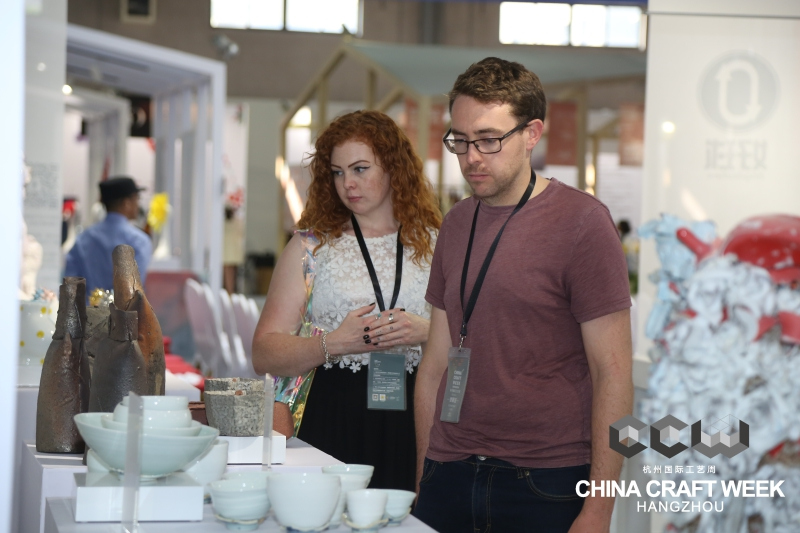
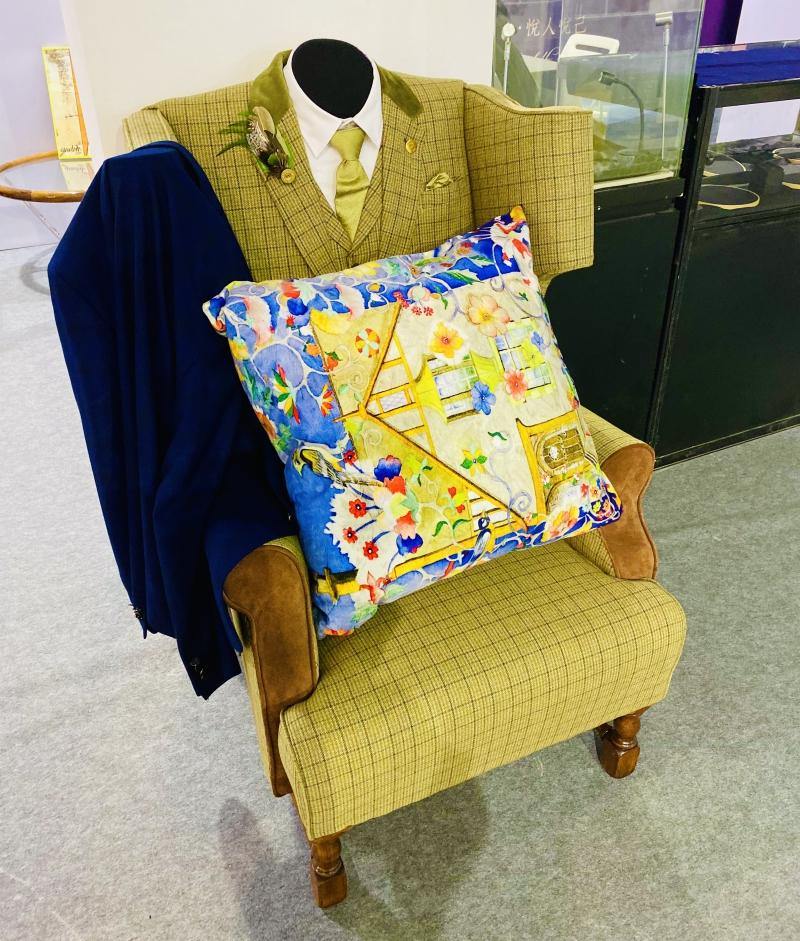
A Glance at Swiss Pavilion
Marco Lazzaroni started making VICUS leather products in 2015. One may not fall in love with these leather products at first sight, but one would eventually do because their beauty stand up under scrutiny. They enhance one’s positive impression of the Swiss craftsmanship: accurate, faultless, perfect. Lazzaroni says all of his products are handmade and it takes him a whole day to make one backpack. Asked how a young man in his 20s can dedicate himself to the hand-making of leather products, he says he wants to make really good products. His philosophy is, good products last and fast products are wasteful. Young consumers in Hangzhou responded to the Swiss craftsman’s aesthetics, business philosophy and craftsmanship warmly. Most of his leather products sold out at the four-day event. Marco Lazzaroni likes Hangzhou. He has made friends in the city. He likes the Hangzhou cuisine very much. He was tremendously impressed by the food he enjoyed at Grandma’s Kitchen, a popular chain of restaurants.
Next to VICUS leather products was Zen O fashion crafted by designer Zeno. The designer cares for nature. And the fact that brand name Zen comes from the designer’s Zeno says a lot about his attitude toward environment protection. One key element of his craft products is that he buys from inventories of fashion houses. After redesign and printing good patterns on them, he resells these products as his own. His products are popular with young people.
